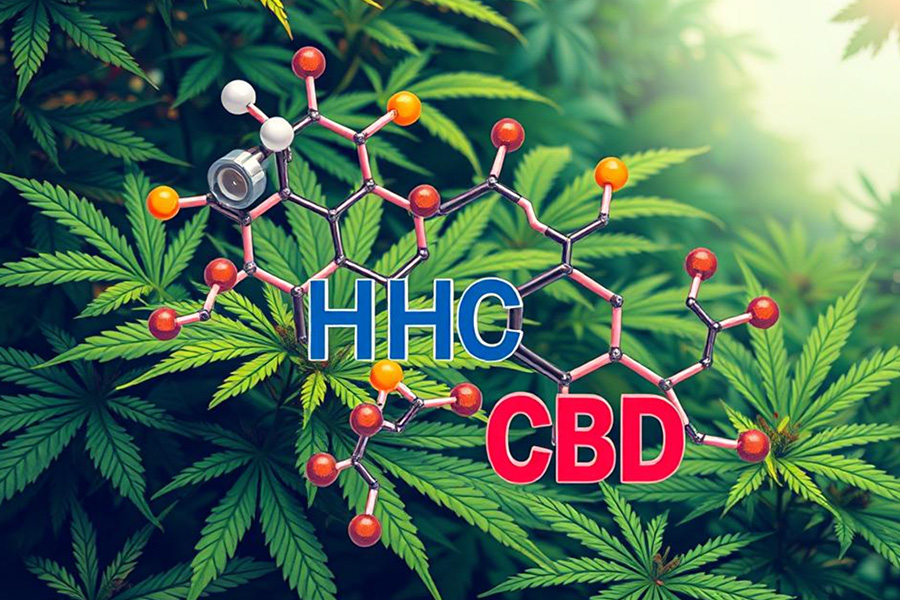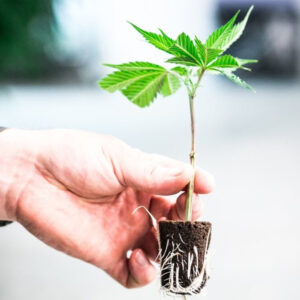What is Hexahydrocannabinol?

Hexahydrocannabinol, often called HHC or HXC, is a type of cannabinoid made from CBD. It happens through a process called hydrogenation. This process adds hydrogen to HHC, making it more stable. HHC is part of a big family of cannabinoids. This family includes THC and CBD, which come from the Cannabis sativa plant. This plant has over 400 different things in it.
HHC is getting a lot of attention because it’s unique and might help people feel better. It started being sold in Ireland in 2022 and is becoming more common in the cannabis world. About 20% of young people who need help with addiction in Ireland have used HHC. This shows it’s both popular and could be misused. There are also worries about its safety, like cases where HHC caused psychosis.
When making HHC, scientists get two types: (9S)-HHC and (9R)-HHC. Research says (9R)-HHC works better on a certain part of our body compared to (9S)-HHC. (9R)-HHC acts a lot like Δ9-THC, but (9S)-HHC doesn’t as much. People are studying HHC to see if it can help with long-lasting pain, anxiety, and the stress that comes after a scary event (PTSD).
Key Takeaways
- Hexahydrocannabinol (HHC) is a semi-synthetic cannabinoid derived from CBD through hydrogenation.
- HHC has been on the Irish market since 2022 and accounts for 20% of presentations to adolescent addiction services in Ireland.
- The compound can produce (9R)-HHC and (9S)-HHC, with varying effects and receptor affinities.
- Studies are exploring HHC’s therapeutic potential for chronic pain, anxiety, and PTSD.
- HHC is gaining attention both for its medicinal prospects and the associated health risks.
Introduction to Hexahydrocannabinol
Hexahydrocannabinol (HHC) is interesting. It comes from cannabis but is not as famous as THC. Yet, it’s getting a lot of attention. This section will talk about cannabinoids, go back in time to look at HHC’s past, and see why people like it nowadays.
Overview of Cannabinoids
There are many cannabinoids in cannabis plants. Scientists have found over 100 different kinds. The most familiar ones are Delta-9 THC and CBD. HHC is like THC but comes from hemp and is made differently. It happens through a process called hydrogenation. This changes other cannabinoids into HHC.
Historical Background of HHC
HHC was first discovered in the 1940s. It wasn’t well-known until recently, though. HHC is similar to THC but made in a lab. This process changes CBD from hemp into HHC. This method gives HHC stability that THC doesn’t have.
Why is HHC Gaining Popularity?
HHC is becoming popular for several reasons. It is seen as a legal option to THC in some places. HHC also lasts longer and is more stable. Early studies show HHC feels like THC but lighter. This makes it good for people who want less intense effects.
Also, using HHC might avoid legal issues better than using THC. Here’s a look at HHC and other cannabinoids compared:
| Cannabinoid | Source | Legal Status | Psychoactive Effects |
|---|---|---|---|
| HHC | Semi-synthetic (Hemp-derived) | Varies by region | Milder than THC |
| Delta-9 THC | Natural (Cannabis) | Often restricted | Strong |
| CBD | Natural (Cannabis) | Generally legal | Non-psychoactive |
How Hexahydrocannabinol is Produced
It’s key to know how HHC is made because it shapes its effects and how long it lasts. We’ll look at how it’s made in the lab, compare it to other methods, and explore how it’s different from other cannabis compounds.
Hydrogenation Process
The creation of HHC starts by changing THC. This involves adding hydrogen to THC. This change affects how strong it is and its shelf life.
The new HHC has a unique makeup compared to THC. This is why its effects are not the same.
Lab Synthesis vs. Natural Occurrence
HHC isn’t found much in nature, so making it in labs is the go-to. It’s not like CBD or Delta-9 THC that plants make lots of. Scientists have special ways to make HHC. This ensures it’s clean and reliable. Made in labs, HHC can be controlled better, from strength to effects.
Differences from Other Cannabinoids
HHC stands out from other cannabis compounds. The changes in its structure make it unique. It interacts with body receptors differently. For example, how HHC connects with receptors changes based on its form. The 9R form of HHC sticks to one receptor better than the 9S form. This shows us that HHC works in a special way in our bodies compared to other well-known compounds.
- Binding Affinity: Differences in how HHC binds to cannabinoid receptors.
- Stability: Hydrogenated HHC exhibits increased stability over other cannabinoids.
- Psychoactivity: The psychoactive effects of HHC can vary, often described as more subdued compared to Delta-9 THC.
| Cannabinoid | CB1 Binding Affinity (nM) | CB2 Binding Affinity (nM) | Stability |
|---|---|---|---|
| 9R-HHC | 15 ± 0.8 | 13 ± 0.4 | High |
| 9S-HHC | 176 ± 3.3 | 105 ± 26 | High |
| Delta-9 THC | 15 ± 4.4 | 9.1 ± 3.6 | Moderate |
HHC vs. THC: Key Differences
Hexahydrocannabinol (HHC) and tetrahydrocannabinol (THC) are two compounds from the cannabis plant. Over 100 cannabinoids are found there. HHC and THC stand out because of their effects and legal situations.
THC is famous for its strong psychoactive effects. It works well with CB1 receptors in our brains. This makes people feel “high.” HHC does not connect as well with these receptors. So, it might make people feel less high than THC.
HHC is rare in cannabis plants, found in less than 1%. We make it in labs from THC. People say HHC offers a buzz. It’s like the effects of Delta-8 and Delta-9 THC but weaker. Users feel happy and may see or hear things differently with HHC.
Legal aspects are key when comparing these compounds. Hemp with up to 0.3% THC is okay under the 2018 Farm Bill. But THC is still not allowed by federal law in many places. HHC’s legal status isn’t clear. It changes from state to state.
HHC and THC look similar—in their chemical makeup. But they act differently in our bodies and under the law. HHC, usually made in labs, might have fewer legal issues. It also has gentler effects. This makes it more appealing to some.
Comparing THC and HHC’s effects reveals a complex picture. It involves how they’re made, their strength, and how they interact with our body. As research goes on, we’ll understand their pros and cons better. This will give us more choices in the cannabis market.
HHC vs. Delta-8 THC
When we talk about HHC and Delta-8 THC, we need to look at what makes them different. Both have their own special traits. Yet, they share some qualities with other members of their family.
Potency Comparison
THC is getting noticed for its unique cannabinoid effects. Compared to Delta-9 THC, Delta-8 is less powerful. It doesn’t connect as well to the body’s receptors. On the other side, HHC gives a strong buzz. Some say it’s almost as strong as Delta-9 THC. HHC is made differently, which might explain why.
Legality Aspects
The laws for HHC and Delta-8 THC can be tricky. They change from place to place. After the 2018 Farm Bill, Delta-8 THC got popular. Still, states have their own rules for it. HHC’s legal status is less clear but often follows Delta-9 THC’s rules. Both are okay under federal law if they’re in hemp products with less than 0.3% THC.
Safety Concerns
Using HHC and Delta-8 THC safely is very important. Since the FDA hasn’t given the green light, it’s best to start small. Make sure what you’re using is tested and clean. When trying these products, be careful and stay safe.
Effects of HHC
Hexahydrocannabinol, or HHC, is catching attention for its special effects. It interacts with the body’s cannabinoid receptors in unique ways. We’ll look into its psychoactive traits, short-term effects, and what users say about it.
Psychoactive Properties
HHC’s effects are somewhat like THC’s but with key differences. Studies show HHC has similar properties to THC but is less strong. It binds to cannabinoid receptors well, suggesting it might have health benefits.
Short-term Effects
Users report various short-term effects from HHC. They feel more relaxed, have less pain, and sleep better. HHC seems to have a stronger calming effect than THC. Yet, it may cause anxiety, dry mouth, hunger, dizziness, red eyes, and a fast heart rate.
User Experiences
People share diverse experiences with HHC. Many say it causes less anxiety than Delta-9 THC. On average, people use HHC about 10 days a month. However, about 17% report negative side effects. Around 20% experience withdrawal symptoms when they stop using it. Despite this, most users like it for its gentle effect and legal status.
Is HHC Safe to Use?
The safety of HHC is widely talked about by researchers and users. It seems as safe as THC, but there’s little research on its long-term effects.
A study in 2022 showed HHC might be safe for us to use. This finding highlights the importance of more research. Most users report handling HHC well without bad side effects.
Users have noted some side effects like feeling sleepy, having dry eyes, and a dry mouth. Nausea, stomach upset, feeling sluggish, and sometimes diarrhea are also reported. Yet, no big studies back these up. There haven’t been any major bad reactions noted.
When trying HHC for the first time, start small. Wait at least 60 minutes before taking more. How HHC affects you can really depend on how you use it, like eating it or vaping.
HHC use does raise some safety issues similar to THC. Stories say it might make you feel intoxicated. You might get a dry mouth, heart race, or feel faint. Starting with very small amounts, like 1-2 mg, might help avoid these effects.
“The move toward greater understanding of HHC’s safety necessitates diverse studies, particularly given the gap in data regarding long-term health risks.”
Mixing HHC with things like alcohol might make side effects worse. Even though some studies and stories are positive, there’s not enough regulation. This lack of oversight is worrying regarding the safety and quality of HHC products.
Considering this, we shouldn’t ignore the possible dangers of HHC. With HHC getting more popular, we need clear rules and detailed studies. This is crucial for keeping us safe and informed.
| Aspect | Details |
|---|---|
| Reported Common Side Effects | Drowsiness, dry eyes, dry mouth, nausea, upset stomach, lethargy, diarrhea |
| Adverse Effects | Anxiety, dizziness, insomnia, increased appetite, paranoia, red eyes, rapid heart rate |
| Initial Dosage Recommendation | Start with a small serving (1-2 mg) and wait 60 minutes before consuming more |
| Research Gaps | Long-term effects, thorough content verification, regulatory oversight |
Medical Benefits of HHC
Hexahydrocannabinol (HHC) is a new find in the US and Europe. Early evidence points to possible HHC benefits, especially in cannabinoid therapy. Though similar to THC, HHC’s effects are usually gentler. This is why some people prefer it for healing purposes.
A survey with 109 folks showed many felt less anxious and in less pain after taking HHC. This supports wider HHC medical research looking into cannabinoids and our health. Still, these findings are mainly from stories, not strict studies. More research is needed to prove HHC’s benefits.
HHC has two types, 9R and 9S, with 9R being the active one. Making HHC gives a mix of both, which changes how well it works. The different mixes can change how users feel the HHC benefits.
Even with good early feedback, no health authority has okayed HHC treatments yet. Present research on HHC focuses on how it might help with anxiety and pain. However, confirming these effects and knowing the long-term impacts need more studies.
| Aspect | Details |
|---|---|
| First Appearance in Market | Late 2021 (US), Late 2022 (Europe) |
| Classification | New Psychoactive Substance (NPS) by EU EWS |
| Potency | Lower than THC; between Delta-9 THC and Delta-8 THC |
| Primary Effects | Reduced anxiety, pain relief, mild euphoria |
| Legal Status | Varies, often dependent on combination with other cannabinoids like THC |
Ways to Consume HHC
More people are trying HHC because of its unique effects. There are many ways to take it. Each method has different start times and effects. Here, we’ll talk about the ways to use HHC.
Vaping
Vaping is a top choice for using HHC. It works fast, usually in 15 to 20 minutes. People like it because it’s easy and quick. Vaping HHC makes the psychoactive effects milder than THC.
But, users should wait 15 to 20 minutes between uses to avoid too much intake. Also, be aware of side effects like dry mouth and dizziness.
Edibles
Edibles are another way people enjoy HHC. They last longer but take 30 minutes to 2 hours to start working. This method is good for those who want lasting effects. It’s more gradual than vaping.
Start with a small amount and wait 2 hours before taking more. Edibles are easy to use and dose.
Tinctures and Oils
Tinctures and oils are also great for HHC use. They allow for precise dosing. You can put drops under your tongue or add them to foods. This gives a fast or extended effect.
It’s best to start with a small dose and increase slowly. This helps find the right amount for you.
In conclusion, there are many ways to use HHC, like vaping, edibles, and tinctures. Each method has its benefits. They meet different needs based on how quickly they work and their effects. HHC products are versatile, making the experience better.
Availability of HHC Products
The HHC market is growing, making products easier to find. This is true especially in areas with easy cannabis rules. Many new cannabinoid products are coming out to meet the increased interest.
People like HHC because it makes them feel alert and energetic. They enjoy trying different kinds like gummies, vape cartridges, and flowers. HHC vapes and disposables are very popular. They often mix HHC with other things like THCB, Delta 8, CBD, and CBG.
But, there’s a downside. Some HHC products might not be good quality. It’s important for buyers to look for a Certificate of Analysis (COA). This ensures the product is safe and accurate.
HHC lasts a long time and doesn’t get ruined by UV light. This makes it a good choice. CannaBuddy stopped selling HHC-O because of safety worries. They now only sell standard HHC products. These are better at not getting damaged by light, heat, and air.
The future looks bright for HHC. The market is changing, bringing more and stronger products. As science gets better and rules change, HHC’s world will keep getting better. This means people will have more ways to enjoy its benefits.
Conclusion: The Future of HHC
The future of HHC looks bright as studies grow and laws change. Roger Adams found HHC in 1947. He made it by changing THC into HHC. This process uses special metals and makes HHC last longer.
HHC is stronger than CBD but not as strong as THC. This makes it special in the market. The cannabis world is always coming up with new things. HHC’s place in this world depends on people liking it and new studies.
People say HHC helps them relax and worry less than THC does. This is why more people are trying it. Products with HHC, like gummies, oils, and vape stuff, are popular. They are legal in places that allow hemp from the 2018 Farm Bill.
But, HHC’s legal side is still not set in stone. It is sold where hemp is okay, but laws might get stricter. The future of HHC hinges on more research and legal reviews.
As we move forward, HHC could become a key cannabinoid. It fits into how the cannabinoid world is changing.




